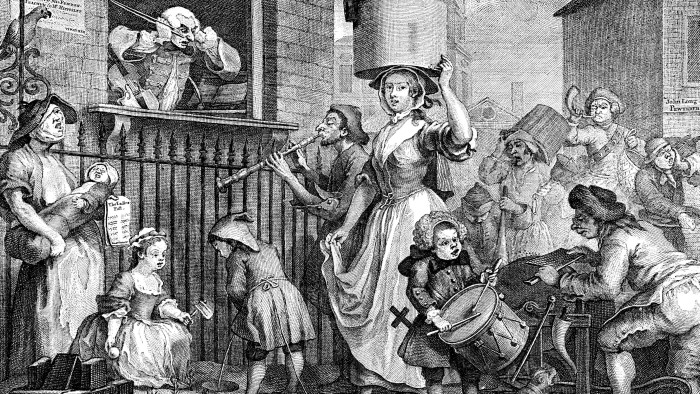Unlock the Editor’s Digest for free
Roula Khalaf, Editor of the FT, selects her favourite stories in this weekly newsletter.
According to the Liberal Democrats, a “scourge” is afflicting “the quiet majority” of travellers on British public transport. It is the inconsiderate behaviour of other passengers who watch videos and play music without using headphones, inflicting their viewing and listening tastes on everyone else.
Ahead of local elections next week in parts of England, the Lib Dems have promised to crack down on these “headphone dodgers”. Fines of up to £1,000 are threatened. The quiet majority, inwardly seething as influencers babble away on TikTok or football commentary rat-a-tats from tinny smartphone speakers, will be rescued from the selfish minority.
At least that’s the idea. In practice, the battle between noisemakers and their unwilling listeners is never ending. The recent suspension of busking in London’s Leicester Square — “psychological torture” for nearby office workers, a judge ruled — echoes a parliamentary act in 1864 imposing fines of up to 40 shillings on street musicians (about £215 in today’s money). That followed a letter signed by writers and artists, including Charles Dickens and John Everett Millais, protesting that they had been “driven nearly mad” by “beaters of drums, grinders of organs, bangers of banjos . . . bellowers of ballads”.
There is a wonderful engraving by William Hogarth from 1741 showing this cacophony in full effect. “The Enraged Musician” depicts an affronted violinist looking out of his window with hands clasped to ears, unable to play due to the tumult of London street life. To add insult to injury, just below him comes the plashing of a small boy peeing against the railings of his building.
For urban romantics, a city’s vibrancy is measured by its noisiness. If we think of New York in the 1970s and 1980s, a soundtrack springs to mind. Sirens wail and horns blare. Hip-hop, punk, disco and salsa spill from every block. Voices are raised. In contrast, quietness is suburban boredom, or perhaps even worse. “The silent majority” used to be a euphemism for the dead.
But there is a double standard here. Most urban romantics don’t actually want to live amid the clamour they idealise. Sirens and horns sound better in Martin Scorsese films than they do in reality. Loud music is less vibrant when it’s 3am and you can’t sleep.
I’m ambivalent about headphone dodgers on buses and trains. Short journeys, all right; long ones, absolutely not. But I can be hypersensitive about some noise pollution. Music played by sunbathers on beaches is a pet hate, ditto talking at gigs. Then the open-minded sophisticate that I fancy myself to be is replaced by a character closer in spirit to Disgusted of Tunbridge Wells. Except, unlike that fabled writer of angry letters to newspapers, I do nothing.
In a poll commissioned by the Lib Dems, 54 per cent of respondents expressed discomfort about asking someone to turn down music on public transport. I sympathise. Like other quietists, I stare ahead with knotted stomach and gritted teeth when confronted by noisemakers. The inner torment is positively Dostoyevskyan. Hot fury is compounded by the reckoning I am forced to make with my cowardice.
Are swingeing fines the answer? I think not. They would only add to the prohibitive messaging littering everyday life, the irritating ambient hum of officialdom. No ball games. £100 fine for littering. See it. Say it. Sorted.
There is a simpler remedy. The quiet majority must find their voices. They should pipe up and tell the person across the aisle watching Knives Out who the murderer is. Or inform the individual playing the latest Drake song that his early stuff was best. In a judo-style flip, antisocial behaviour will thus become the catalyst for annoying social interaction. And as the taboo of British public transport is broken — conversation with strangers — the offender will silently vow to wear headphones next time.




